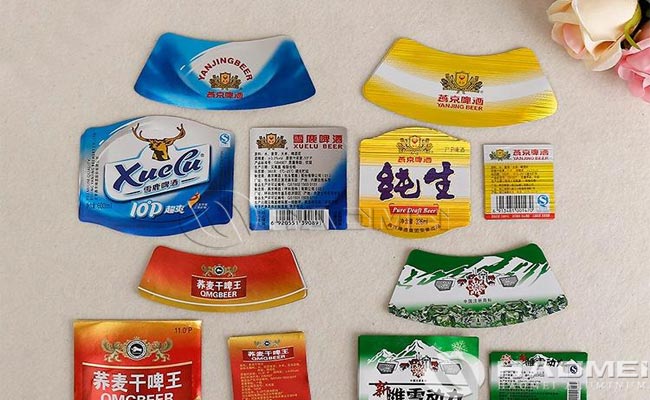Categories
- News From Haomei (290)
Metal foil bottle labels is used as the decoration and anti-counterfeiting of special beer bottles. The material called aluminum foil in beer bottle label packaging is actually pure aluminum with a high content. The advantages of aluminum foil are that it is easy to process, has good printability and bonding performance, and will not affect printing and labeling due to silk flow compared with paper labels. The processed aluminum foil bottle labels surface has been polished, flat, clean and bright, it is suitable for roll gravure or flexographic printing. It is not limited by color, pattern and design. It can also be printed with special temperature-sensitive inks or add unscrewing caps.

The grades of foil bottle labels are 1235, 8011 and 8079, temper: O soft, thickness: 0.0095-0.0105mm, width: 335mm -730mm, ID: 76mm, 150mm, 300mm, 405mm. The beer aluminum foil bottle label, also known as the bottle neck label, has the original natural metal texture, brightness, and is more eye-catching than any other substrate. It is integrated with the belly label and the back label to create the perfect brand of beer. Many high-end beer in Europe and the United States all use aluminum foil beer bottle label. The original aluminum foil used by the printing plant is made by four processes of melting, hot casting, rough pressing and fine pressing of standard aluminum ingots with a purity of 99.5% by the aluminum foil factory. Coating grease is to prevent the foil roll from sticking during the rolling process, and there should be no oil residue on the surface of the finished foil, otherwise it will affect the adhesion of the printing ink.
After printing, the rolled aluminum foil bottle labels need to be embossed/pierced, cross-cut, flattened, die-cut or die-cut in the subsequent processes of the packaging plant to form the standard shape required by the customer. These mechanical processes affect the mechanical properties and processing performance of aluminum foil materials to varying degrees. The optimization of the connection can reduce the damage to the tensile strength (Mpa) and elongation (%) of the aluminum foil label, and ultimately ensure the labeling adaptability of the brewery.